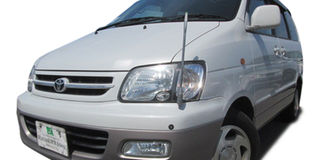Ask the Mechanic

HOW MUCH FUEL SHOULD A NOAH 2000 CONSUME?
Hello Paul, my Toyota Noah’s fuel consumption is around five kilometres per litre. Is this okay? Moze
Hello Moze, your Toyota Noah Townace 4WD 2000 fuel consumption is rather high. The Noah 2000 comes with a simple 3S-FE 2.0 litre engine, whose fuel consumption on the highway should be between 12-13 kilometres per litre. In urban slow traffic, its fuel consumption should be about nine to 10 kilometres per litre.
These fuel statistics are influenced or achieved by use of fuel efficient unleaded fuel, top notch engine maintenance such as new spark plugs, clean air filter, replaced fuel filter and clean fuel injectors for efficient fuel delivery, up to date engine oil service, which makes the car engine run lighter and a serviced automatic gearbox for quicker up shifts.
The maintenance issues work hand in hand with the passenger/cargo load you carry as well as driving sensibly by avoiding jack rabbit starts and stops or aggressive acceleration. Tyres with a good tread condition also contribute to good fuel economy. Worn out tyres have less traction and, therefore, use more engine energy (fuel) to move the vehicle. To improve your fuel economy, visit a garage or service bay to inspect the engine and gearbox maintenance condition to establish what needs attention in order to improve your Noah’s fuel economy.

MY TOYOTA GEARBOX DELAYS TO CHANGE GEARS
Lately, my Toyota Corona A100 (kikumi) takes time to change gears. What could be the problem?
Joseph Okalebo
Hello Joseph, please service the automatic gearbox with genuine automatic transmission fluid. You may also need to replace the gearbox filter in case it is filled with dirt due to delayed service. It is a rare find but Toyota parts dealers should be able to help.
Before you service the gearbox ATF and filter, consider getting a computer diagnosis if available with your service provider to make sure the gearbox solenoids in the valve body are all working well. Chances are, they will be okay since you are only experiencing delayed gear shifts and not worse.

WHY DO MY TOYOTA FRONT BRAKES OVERHEAT?
Hello Paul, at 280,000kms, my Toyota Hiace overheats the front wheels. A mechanic changed the piston but this did not help. Also, the handbrake dashboard light will not go off even when the handbrake is disabled. Kindly advise.
Deo Walugembe
Hello Deo, overheating brakes is not a normal occurrence. There is need to investigate the front brake system and rule out mechanical failure or wrong fitting of brake calipers and pads.
The common cause of brakes overheating is failure of the brake calipers. These are pressurised by hydraulic brake fluid to engage the brake pads to the friction discs of each wheel. At a high mileage, say 280,000kms like in your case, it is not unusual to find failing brake calipers, especially where corrosion damage exists. Delay in renewing all brake fluid also contributes to brake caliper failure.
Brake fluid is designed to help cool brake components, prevent corrosion damage as well as lubricate moving pistons in the caliper kits. When brake fluid ages, it ceases to protect the sensitive brake components and instead contributes to their damage. Old brake fluid also has accumulated moisture, which reduces its performance which may affect prompt engagement and disengagement of brake caliper pistons besides increasing the likelihood of overheating, damaged seals and jamming which causes overheating.
Fitting of defective brake components such as faulty used calipers or wrong fitting of brake pads can also cause jamming. A mechanic should review and examine the entire front brake system to establish what is causing the overheating.

MY NEW BRAKE PADS MAKE A FUNNY NOISE
Hello Paul, I have a Toyota Premio 2002 whose front and back brakes make a funny noise even if they are new. Please recommend a genuine mechanic to fix this.
John Bosco.
Hello John Bosco, have the brake discs inspected again. Persistent squealing or squeaking brake noise after replacing the brake pads is usually caused by damaged brake discs. Before replacing worn out brake pads it is prudent to inspect the brake discs and confirm that they are not excessively worn out with uneven surface and ‘ridges’ or a raised ‘lip’ on the disc edge.
This unevenly worn out brake disc surface will continue to squeak as the new brake pads engage it when you apply brakes. If the discs are not severely worn out, they can be skimmed on a lathe machine to make their surface smooth. However, for vented two layer brake discs the disc width is usually too thin to allow resurfacing. You run the risk of driving with an extremely thin brake disc width, which crack and cause could brake failure during emergency hard braking.
Send sms: mycar (space) your comments and questions to 6933 Or email them to: [email protected]




